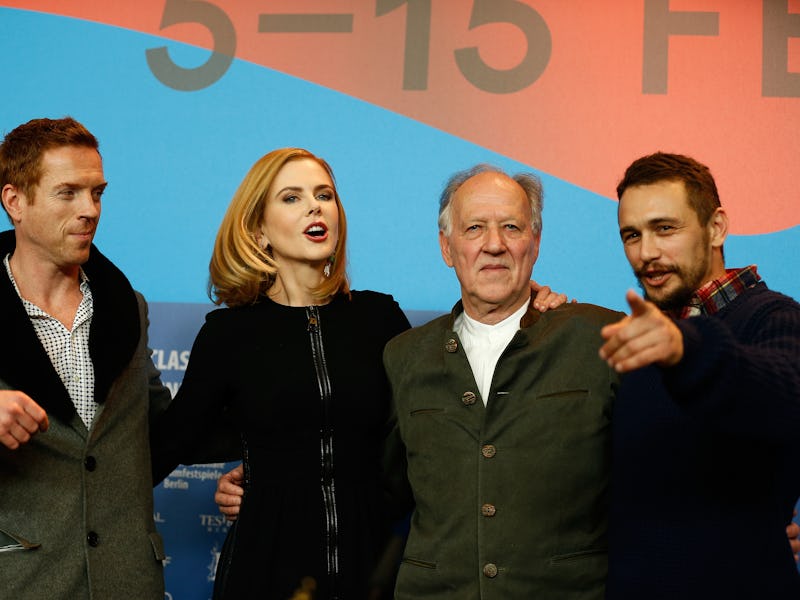Will Werner Herzog's Panned Nicole Kidman and James Franco-Starring Film Ever Be Released?
No one wants to acknowledge 'Queen of the Desert,' Herzog's first resounding flop -- a multimillion dollar historical epic.

You claim to love Werner Herzog. You’re a devotee of Grizzly Man, maybe you love his Klaus Kinski films — his Nosferatu remake or Aguirre, the Wrath of God — maybe you get into some Bad Lieutenant: Port of Call New Orleans, or prefer his newer documentaries like Cave of Forgotten Dreams and Into the Abyss. You may be excited for his upcoming rumination of the future of technology, or the film with the best title in history — Lo and Behold, Reveries of the Connected World — which was received well at Sundance.
But you’re not a real fan if don’t know that Herzog filmed a feature film for $36 million in 2013 and 2014, starring Nicole Kidman, James Franco, Damian Lewis, and Robert Pattinson, and based on the life of turn-of-the-century nomadic archeologist, writer, and general eccentric personality Gertrude Bell.
Evidence of Queen of the Desert’s existence has been largely swept under the rug. After premiering at the Berlin Festival last February and playing at some European theaters, it’s made back 1/36th of its budget, but no wide theatrical or even DVD/Blu-ray/on-demand release has been confirmed. This is likely because, believe it or not, the film was roundly panned. Today it holds a six percent on Rotten Tomatoes, and can be accessed only in the United States if you’re willing to scour the torrent circuit.
Is a movie that comes from one of the most beloved working directors really that bad? Is it possible? Once you see the film — if you’re ever able to — you’ll find that it is not terrible in the aggressive way you might expect from such a poorly rated film. It is simply Herzog attempting a very odd experiment — a period historical semi-epic. There’s a complete absence of clear tone and tension, and the plot and sketchy, aloof characters fall short of grabbing the audience’s attention in any way.
It’s an amazing watch because there is so little to latch onto in terms of conflict or themes, as if Herzog just took Nicole Kidman, a ton of extras and a bunch of loud-as-hell camels to the desert and made things up as he went along. Voiceovers added late, of Bell (Kidman) writing letters back to her ill-fated lovers, do most of the work of advancing what little plot is there, and the imposing, stoic camels, who are extremely charismatic, are amazing to watch in action.
This methodology, actually, is similar to most of Herzog’s narrative films. It’s a quest film — not quite a downward-spiral narrative in the vein of Cobra Verde or Aguirre, but nonetheless an individual-against-nature tale. Bell becomes entranced and swallowed up by the desert, driven away from the rest of the world that has not treated her well, on a never-ending directionless journey.
The world she is fleeing from, however, doesn’t treat her poorly enough for this plight to resonate deeply with the viewer. The image of the oppressive, patriarchal British government representation in Tehran is sketchy and illogically inserted into the flow of the action. Herzog’s movie aims for verisimilitude and accuracy with regards to Bell’s story, but his dialogue is slightly stilted, imbued with his own warped view of human nature as something unsettled and anarchic — almost unknowable. Kidman and Franco, especially, are not always able to pull it off convincingly.
Herzog leads like Kinski and Bruno S. (Stroszek, The Enigma of Kaspar Hauser) have been dynamic presences on-screen, driving their director’s pleasantly amorphous films forward with their hyper-realistic, unpredictable energy and bizarre, improvised tics. Kidman, on the other hand — a more traditional actor — is not able to carry the film on her back. She does a very good job embodying the character, and navigating what clear emotional shifts there are to put across. But there is simply not enough for her to work with in the script, and Herzog’s approach seems to have been extremely hands-off with the actors. Unfortunately, the beautiful cinematography and Moroccan setting can’t save the day by themselves.
For those of us who love Herzog, even seeing a decidedly bad film by him is an instructive experience. It still, in some crazy way, speaks to what is great and unique about all of his work. The most exciting directors are always the ones who make polarizing and even outright misbegotten projects. Queen of the Desert might be a tedious two hours, but it’s clear Herzog had a singular vision he was taking a chance on: realizing Gertrude Bell’s fascinating biography in a faithful but lightly mystical way. Herzog believed in something here, but it’s impossible for the viewer to access.
Some fans in the United States are hungry to see the film, and in January some evidence that we may be able to see it in theaters soon was tweeted from the film’s official Twitter:
So keep your eye out for possible (but still possibly impossible) news about this true flop of a film very soon. Queen of the Desert is ambitious but not ambitious, incredibly weird but blasé, a truly Herzogian riddle if there every were one — this time with 100 percent more Franco. See it, but be prepared.